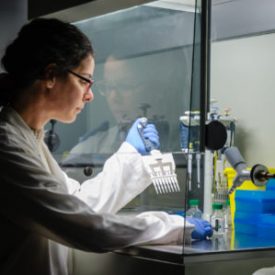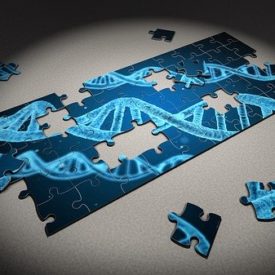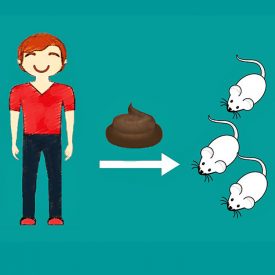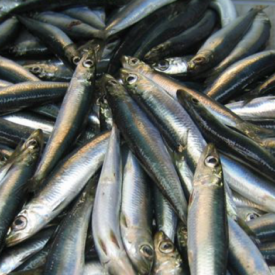Diet Against Atherosclerosis: Focus on Food‐Derived Bioactive Peptides
Atherosclerosis: A Cause of Many DisordersAtherosclerosis, a chronic condition characterized by the accumulation of lipids and fibrous elements in the arteries, is the major cause of cardiovascular disease [1]. Given today’s epidemiological situation, it should be mentioned that people with pre-existing cardiovascular disease appear to be at a higher risk of developing complications of COVID-19 [2]. A healthy diet is one way to reduce the risk of developing atherosclerosis. Specifically, research with mouse and rat models has shown that there might be a special advantage of bioactive peptides that can be found for instance in organ meats. Atherosclerosis develops progressively,...
Calculating your Genetic Risk for Disorders
Would you not like to know which disorder would hit you in your future? To know what to do, if possible, to prevent this disorder from developing? This future scenario is soon to be true, as an increasing number of advertisements of commercial genetic tests invite you to get to know the “truth” about your future health. Twin studies have demonstrated that many human traits and medical conditions are highly heritable. In contrast to some diseases that are caused by one or a few rare genetic variants, most common disorders are polygenic, which means that several common and rare gene...
Is Maternal Excess Weight or Obesity Prior to Pregnancy a Risk Factor for ADHD?
Attention Deficit Hyperactivity Disorder (ADHD) is highly heritable. But in addition to this genetic aspect of ADHD, many environmental risk factors, and potential gene-environment interactions also increase the risk for the disorder [1]. One potential modifiable risk factor for ADHD is excess weight or obesity of the mother before pregnancy. More and more observational studies are investigating this at the moment. However, it is very difficult to determine from these studies whether prior to pregnancy excess weight or obesity really causes ADHD (in other words, to rule out that there is not another factor, called a confounder, that causes both the excess...
ADHD and Gut Bacteria: How Mice Can Help Us to Understand Their Link
Can gut bacteria cause ADHD? While there are some signs that the bacteria in our gut play a role in mental health, it is difficult to establish whether – and how – this relationship is causal. By studying mice, researchers have now found that gut bacteria from individuals with ADHD can change the behaviour and brain functioning of mice after they have been given a poo-transplantation from these individuals. This is a first hint that gut bacteria indeed may play a part in the development of ADHD and other mental health conditions. There are many factors that influence our mental...
How to Produce Probiotics Yourself
Probiotics are foods that contain living microorganisms that often belong to the bifido or lactic acid bacteria. Probiotics are live bacteria and yeasts that are beneficial for you, especially for your digestive system. We usually think of these as germs that cause diseases. But your body is full of bacteria, both good and bad. Probiotics are often called “good” or “helpful” bacteria because they help keep your gut healthy [1]. There are many findings that probiotics can contribute significantly to the balance of our intestinal flora [2]. The health of our intestines plays a huge role when it comes to our health in general. If the intestines are healthy, unwelcome invaders (harmful bacteria, parasites, yeasts), but also many chronic diseases have less chance of proliferating. Raw fermented foods provide living bacterial cultures that support our intestinal flora and strengthen our immune system...
Mediterranean Diet – Responsive Microbiota to Reduce Frailty: A New Study Published in the GUT Journal
Aging is a condition associated with systemic physiological decay, characterized by chronic inflammation, cognitive impairment, and frailty. Well-established findings support the Mediterranean Diet (MedDiet) as a valid strategy to address frailty, also due to its modulatory effect on gut microbiota. The NU-AGE dietary intervention project is a large cohort of more than 1200 elderly individuals from different European countries treated with a customised MedDiet for one year. A recently published study explored the effects of this particular diet on the gut microbiota of a subsample of 612 participants. Authors reported the association between microbiome and adherence to the MedDiet by...
Researchers working from home: testing the effects of the corona crisis on mental health
While health care professionals are busy caring for and treating COVID-19 patients, researchers are currently not allowed in their research institutes. Especially hospitals (where many research institutes are located) are extra careful not to create risks for personnel and patients. The researchers working in the Eat2BeNICE consortium normally work in these environments. They have been working from home for a couple of weeks and probably will continue to do so for another couple more weeks to come. Like all people working from home, researchers have to be creative and find adaptive ways to proceed their work. Many ongoing studies are...
Bacteria from Our Gut Can Make the Main Treatment of Parkinson’s Disease Ineffective
Researchers from Groningen University, The Netherlands discovered that bacteria from our gut can metabolize and block the action of the main drug used to treat Parkinson’s disease [1]. Parkinson’s disease is related to low levels of dopamine in the brain and the main treatment for the patients is levodopa (L-dopa), a precursor of dopamine. The drug is absorbed in the small intestine and through the bloodstream is transported to the brain, where it is converted into dopamine...
Revealing the Genetic Basis of Obsessive-compulsive Disorder
I am quite sure many of you have heard about OCD. Maybe you imagine OCD as just being insistent on having things perfectly organized, and spending some time doing just that. That does not sound too bad, right? Well, in fact, the thing about OCD is that people who suffer from it are excessively preoccupied with “intrusive” thoughts. I am sure at some point we all have had these kinds of thoughts, like “what if I didn’t turn off the stove” or “what if they had an accident”, or “what if I touched something contagious?”. The problem comes with the...
What’s So Special About Fatty Fish?
Fish is an important component of a healthy diet. Especially fatty fish types such as herring, mackerel, sardines and salmon are often mentioned in relation to brain health. Many people take fish oil capsules aiming to improve their mood or feel more focused, or even in the hopes of preventing dementia. What makes fish, and especially fatty fish, so special? Fatty AcidsFatty fish is a rich source of polyunsaturated fatty acids, or PUFA’s (also called omega-3 fatty acids, ω−3 fatty acids, or n−3 fatty acids). PUFA’s come in different kinds, including eicosapentaenoic acid (EPA), docosahexaenoic acid (DHA) and α-linolenic acid...









